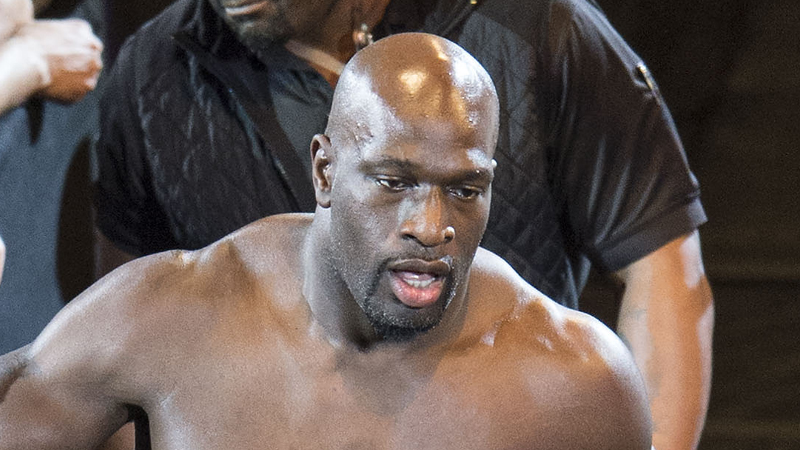Titus O’Neil was interviewed by Chuck Carroll from the CBS affiliate out of Miami about his tumultuous upbringing and found himself constantly getting into trouble. O’Neil, who’s book was released this month, details how he got on the straightened arrow thanks to several role models in his life including a man who was the president of the Florida Sheriff’s Boys Ranch named Patrick Monogue. Quotes from the piece are below:
The description of the book on Amazon stated that you were “repeatedly confronted with negative words and actions growing up.” What was your upbringing like?
I grew up in an under-served community, basically the projects and a single-family [parent] home. My mother… I had three younger brothers, and so we were poor, on government housing. The biggest message that was always spread to me was that I’ll be dead or in jail by the time I was 16 because of my behavior, because of my attitude. Every time I got in trouble, I was labeled a bad kid. There was really not an expected positive outcome from a lot of the kids that were in my neighborhood, just because of the circumstances we were coming from.
What kind of trouble were you getting into?
Mostly fights and just being disruptive. I never sold drugs or did drugs or drank or anything like that. I just had a really bad temper, and I would fight at the drop of a dime.
An adult tells you, “There’s no such thing as a bad kid,” despite that label that you had been given time and time again. Who was that adult, and how old were you when you had that conversation?
I was 12 years old. The man was Patrick Monogue. He was the president at the time for the Florida Sheriff’s Boys Ranch, which is where I ended up going right before my 12th birthday to get out of trouble and to hopefully take a turn for the better.
I’d been getting in trouble there too. They were getting ready to kick me off. I had just signed a contract that I wouldn’t get into another fight, and if I did, I understood that I would be sent home. Thirty minutes after that, I ended up getting into a fight with somebody. They had a meeting, and convened the meeting, and pretty much the decision was made that I was going to get sent home.
He called me in the office, and said, “I’m not going to send you home. I know I’m going to upset a lot of people, but I want you to stay here, because I believe that you can turn things around.” Then he asked me, “Why do you think you get into trouble all the time?”
I said, “I don’t know, man. I’m just a bad kid.”
He told me to lift my head up, and he said, “You know, there’s no such thing as a bad kid.”
I said, “What do you mean? I’m getting in trouble here all the time. You all are getting ready to send me home. I’ve been told I’m going to be dead or in jail by the time I’m 16. How can you say that?”
He said, “I’m not going to give you the answer to that right now, because I truly believe in my heart that you’re going to turn things around, and you’ll come up with the answer for yourself,” which is what I illustrate in the book. “But in the meantime, I want you to know that I love you, and I believe in you.”
At that point, a lot of people had told me that they loved me, but then turned right around and abused me or beat me, but nobody had ever told me that they believed in me.
Did you keep in touch with him? That’s quite the profound conversation.
I kept in touch with him just about every day or every week, all the way until 1997. He passed away from prostate cancer, but he did get a chance to see me do two things that nobody ever thought I would be able to do, and everybody said I wouldn’t do. One was graduate. He saw me graduate from high school, and then he saw me sign a letter of intent to go play at the University of Florida. Then he saw my first collegiate sack, and it was against Peyton Manning, of all people.
He was like a father figure to you.
He was. And another guy named Charles Blalock, who I talked about a little bit in the book as well. Charles Blalock was the Superintendent of Schools in Live Oak, where the Boy’s Ranch was. He took me under his wing as well. He’s actually still alive. He’s actually on his way to Tampa right now to spend the weekend with me, because I have my back-to-school bash here, and he wants to come down and see it in motion.
He loves the fact that I can get 30-plus thousand people in the stadium, and all for a good cause, and giving away thousands and thousands of backpacks, and giving kids physicals and eyeglasses. He’s extremely proud of me.
I’ve only had three guys in life that I would consider father figures to me, Mr. Monogue, Mr. Blalock, and then Pastor Greg Powe, who passed away last year. All three of them were different men, but at the core of them all, they all loved me for who I was, and they wanted to see me be the best me.
RELATED: Titus O’Neil Opens Up About His New Book, Religion, Gangs, More





